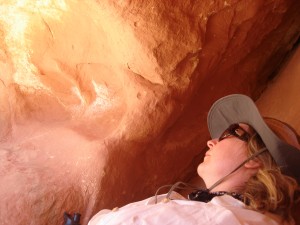
This could be the shortest blog post ever: Don’t bother.
Seriously. If by talking to a narcissist your intent is to actually converse with him, I have news for you. It can’t be done. You can talk around a narcissist. Like, in his general vicinity. If he’s very astute, he might notice your lips moving periodically, maybe connect that to the fragments of sound coming out of your face. As he goes right on blabbering all the fascinating things he has to say about himself.
If you have a big voice, you could try talking over a narcissist, just to see how long it takes before he drowns you out. Because, trust me, he’s never voluntarily going to let you get a word in edgewise.
Your narcissist wouldn’t be a narcissist if he were capable of acknowledging you as a person with words to contribute. The disorder arises from the absence of a core self, manifest as a profound lack of empathy. Constitutionally, your narcissist just isn’t equipped to give a shit about your half of the conversation.
For example, the last time I visited my narcissistic parent, he decided not to put in his hearing aid. Even though I’d flown across the country, and my sister-in-law and niece had flown from Europe. He doesn’t pretend, anymore, that we might have something to say that’s worth hearing.
But here’s the bright side. You don’t actually have to talk to a narcissist, even if he’s a member of the family.
Sure, you might be seated next to him at the Thanksgiving table. Maybe you’ve been sitting there for years, wracking your brain trying to come up with some kind of strategy to shut him up. To make him listen to something other than the sound of his own yawp for just five seconds. More than once you’ve had your fork poised, straining to stop yourself from plunging it into his hand.
But even when your sense of family obligation (i.e., codependence) keeps your butt in the chair next to his, there’s no reason to remain psychically present. If your mind wanders off for a stroll in a more pleasant clime, I guarantee your narcissist won’t notice. He just needs one warm body for an audience. If you’re a breathing carcass with ears, he’s good to go. While he’s holding forth, you can astral project halfway around the globe for all he knows.
With practice, you’ll get good at using this psychic travel time for stuff you’d rather be doing—composing dirty limericks, say, or planning out your accessories for the week.
If you can swing it, I highly recommend you do your talking with a narcissist over the phone. At first you might feel obliged to contribute the occasional “Uh-huh,” “Wow” or “Gee” as a sign that you’re keeping up your end of the call. This is entirely unnecessary. Your narcissist is disinclined to waste any of his precious words inquiring about you, whether it’s to ask how you’re doing or to ask if you’re still on the line. Remember, it’s not you he’s talking to. He’s just talking. What you were doing before the call and what you’ll do after it, whether you’re sad or ecstatic, restless or content, fulfilled or anxious—these things are of zero interest.
So go ahead. Put down the phone. Finish fixing lunch or scouring the bathtub. Your narcissist won’t know you’re gone. He’s an expert at carrying on the conversation all by himself.
I know what you’re thinking. Why participate in this charade at all? Why not call your narcissist on his bad behavior and insist he shape up? It works for Dorothy in the movie. She stands up to the wizard, scolding him for scaring people and failing to keep his promises. And he changes right in front of our eyes, becoming the kind-hearted helper Dorothy and the Tin Man, Scarecrow and Cowardly Lion need.
Eleanor Payson, author of The Wizard of Oz and Other Narcissists, acknowledges that, in reality, “we cannot expect the NPD individual to assist us in validating our own strengths” the way the wizard assists Dorothy and Co. “On the contrary, we must discover these strengths through other people and supportive environments.” You might fervently wish that your narcissist could change—could learn to praise your heart, your brains, your courage. That he could learn to take a genuine interest in you. That he could hear you. But the likelihood of those things happening is nil. “You may be forced to recognize that the NPD individual is incapable of change as he remains unable to recognize your feelings, and unrelenting in his effort to control the resources of attention, support, empathy.”
This has certainly been my experience. Confrontation only makes my narcissist defensive and, sometimes, spitting mean. Once, on the phone, I managed to interrupt him long enough to tell him I was tired of having one-way conversations that were all about him. He huffily explained how mistaken I was for seeing it that way, since it is clearly not his nature to be self absorbed. On the contrary, he sulked, he’s a caring listener and healer. When I’ve challenged him in person, he’s gotten physically aggressive, charging me, shouting and jabbing his finger in my face.
My narcissist is certain there’s nothing about him that needs to change to make things better between us.
So I keep my distance, geographically and psychically. I find other people to talk to, people who understand that a conversation, like a relationship, is a two-way street. I screen my calls for wizards. And when, by accident, my narcissist gets through, well:
There once was a lady named Tucker
Who gents liked to turn to for succor.
She might put on airs
When she asked them upstairs . . .







